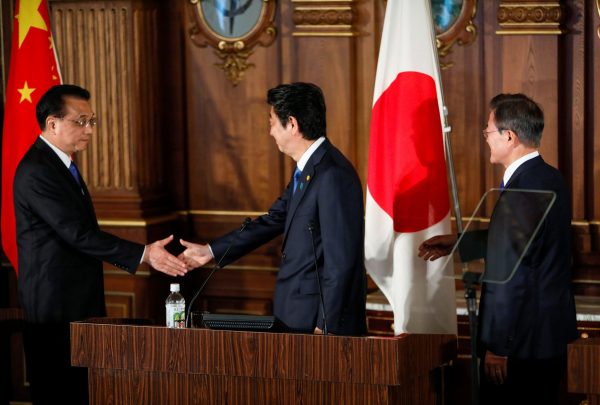Tokyo’s hosting of the Trilateral Summit was the first visit of both the Chinese premier and the South Korean president to Japan since 2011, hinting at a possible improvement in Japan’s troubled relations with its two neighbours.
Chinese Premier Li Keqiang’s and South Korean President Moon Jae-in’s visits to Tokyo did not eliminate the sources of political tension with Japan. But the disputes were temporarily shelved and the two leaders avoided talking about the issues when meeting with their Japanese counterpart Prime Minister Shinzo Abe. Why?
The trilateral summit re-emerged in 2018 as a symbolic body aiming to shape a common approach to the potential denuclearisation of the Korean Peninsula. China’s and Japan’s fears of marginalisation from the peace process on the Peninsula have made the need for collaboration between the two nations an urgent matter. If a peaceful North Korea came into existence and established warm relations with the United States, China and Japan would potentially find it difficult to exert influence over North Korean affairs in the future.
China’s concern about being left out of the peace process was revealed by the warm welcome Xi Jinping extended to North Korean leader Kim Jong-un in China twice in just one month, in an attempt to demonstrate China’s influence on the Peninsula vis-a-vis the United States. China’s attempt to control North Korea in their negotiations offended US President Donald Trump, who subsequently cancelled the proposed US–North Korea summit.
Japan’s concern arose when it was omitted from a joint statement launched by Kim and Moon in Panmunjom on 27 April 2018 as a relevant player in the bid to attain a peaceful regime on the Peninsula. Japan views its exclusion from the peace-building process as consigning to oblivion the Japanese abduction issue — Abe’s most significant agenda item in Japan’s relations with North Korea.
Japan responded positively to China’s move to improve relations between the two countries. Premier Li was treated as a state guest in Tokyo, with time allotted for a meeting with the Emperor — something not granted to Moon. Abe also hosted Li’s full-day trip to Hokkaido despite the Diet being in session.
Still, the negotiations over the contents of the joint declaration were prolonged. It took time for China and Japan to compromise on the wording used to express both China’s anxiety about Japan’s interpretation of history and Japan’s unease about Chinese disinterest towards North Korea’s abductions of Japanese citizens. Both eventually overcame this problem, bolstered by their common recognition that the establishment of future-oriented bilateral relations is far more essential.
China’s interest in trilateral cooperation and mending its relations with Japan has been encouraged by Trump’s trade protectionism and his sharpened tariff retaliations against China. China is ramping up its efforts to conclude pending free trade pacts, such as the Regional Comprehensive Economic Partnership (RCEP) and the China–Japan–South Korea Free Trade Agreement (CJK FTA), as a way to maintain the spirit of free trade in the region and globally.
More significantly, China is challenging Trump’s ‘do-anything’ approach to redressing trade imbalances by turning to more like-minded states— especially Japan, a key US ally — that will continue to support free trade against the rise of US protectionism.
China’s approach to RCEP reflects a much lower level of ambition for trade liberalisation and deregulation than Japan demonstrated in the Trans-Pacific Partnership negotiations. China and Japan’s differing positions on the degree of trade and investment liberalisation and deregulation that should be covered by free trade agreements have caused delays in the development of RCEP negotiations. The promised deadline for RCEP’s conclusion has been extended three times.
Curiously, Japan now seems prepared to compromise with China to realise an earlier conclusion of RCEP. This altered stance is perhaps a sign of Japan’s greater willingness to cooperate with China as it attempts to cope with Trump’s trade egoism and maintain the open global trading system.
To this end, Abe is also trying to forge closer personal bonds with Trump. This effort has helped to prevent Trump from commencing negotiations on a US–Japan bilateral FTA, for which Japan has shown huge reluctance. Yet the time will likely soon arrive when Trump proposes the bilateral FTA, which Japan will have little choice but to accept if Trump fulfils his promise to Abe and requests that North Korea return the Japanese abductees. Abe thus will try to meet with Trump to re-emphasise his request regarding the abduction issue prior to a possible US–North Korea summit in Singapore.
If this were to arise, the recurrence of trilateral cooperation and the CJK FTA negotiations, as well as Japan’s willingness to compromise on RCEP would all function to bolster Japan’s negotiating position vis-a-vis the United States. Japan would be able to assert that it could not make any concessions in an FTA with the United States beyond those that it provided in these other free trade deals.
Takashi Terada is Professor of International Relations at Doshisha University, Kyoto.


When I read political/security analyst’s explanation of events, it reminds me of the descriptions I hear in the evening news to explain the gyrations of the stock market.
All the stories and explanations sound plausible, even convincing!